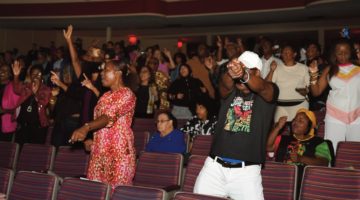 Florida International University
Florida International University
Members of a group that is renovating the historic Hampton House Motel say they are frustrated by Miami-Dade County’s refusal to help them buy adjacent apartments that they want to tear down and replace with a parking lot.
County officials, however, say they don’t own the apartments, and therefore cannot take any action on them.
The apartments, which are behind the Hampton House, are heading toward foreclosure, the historic preservationists say, adding that they are crime-ridden and drug-infested.
“We asked for funds to purchase the apartments and were told we couldn’t have it, but were never informed why,” said Enid Pinkney of the Hampton House Committee.
Shalley Jones Horn, director of Miami-Dade County’s Department of Housing and Economic Development, said the bank that holds the mortgage on the apartments has not yet foreclosed and, in any event, money the county uses to buy foreclosed properties must be dedicated to renovating them for resale.
The landmark motel was among the only upscale accommodations for black people during segregation. It hosted such notables as the Rev. Martin Luther King Jr., Malcolm X and Cassius Clay, in his pre-Muhammad Ali incarnation, on the eve of his first heavyweight fight.
The motel closed in the mid-1970s after integration siphoned off its clientele. It was saved from demolition in 2001 when Miami-Dade County designated it as a historic site.
The county has allocated $4.6 million from a community development bond issue to renovate the structure as a community center and museum.
The Hampton House preservation committee wants to purchase the apartments, which were originally a part of the motel property, and turn them into a parking lot for the renovated motel when Hampton House eventually reopens as a museum.
Jones Horn said the county can’t sell what it does not own, and can’t use money allocated for the purchase and resale of foreclosed homes.
“We do not own those apartments, they are not foreclosed as of yet, and who’s to say we will own them after they are foreclosed? We can’t give something that isn’t ours to give,” Jones Horn said.
Pinkney contacted Jones Horn after seeing her at a televised Miami-Dade County Commission meeting, discussing a county program designed to purchase properties under foreclosure.
“She told me no, but I think there is more she can do and doesn’t want to,” Pinkney said.
Established in the mid-1950s, the Hampton House in its day was the place to go for black celebrities who were visiting Miami. It offered valet parking and a 24-hour restaurant and club, with a strict coat-and-tie dress code.
It was the place where black musicians who performed at segregated Miami Beach hotels stayed because they were not allowed to spend the night in whites-only establishments.
Hampton House was also famous for jam sessions that lasted long into the night, reportedly featuring the likes of Duke Ellington, Count Basie, Lena Horne, Dinah Washington, Sammy Davis Jr., Nancy Wilson and Ray Charles.
Martin Luther King reportedly gave an early version of his “I Have a Dream” speech at the Hampton House. The Miami chapter of the Congress of Racial Equality held weekly meetings there, in which it planned the protests that helped end segregation and, ironically, cost the motel a clientele that — when given the opportunity — opted to stay elsewhere.
IJeff001@Fiu.edu












No Comment